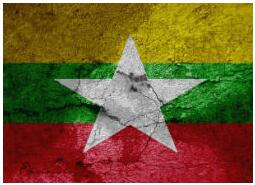Motivation, application and acceptance process
Although international experience in the field of supply chain management is becoming increasingly important, I unfortunately received little support from my German university with regard to the semester abroad. So I decided without further ado to take my application and the organization of a semester abroad into my own hands. After reading some information about MicroEDU online, I decided to write an email for more information.
On the same day I received a friendly email with all the necessary information. To submit an application you need the following documents: the completed application form from MicroEDU , a letter of motivation, your CV, proof of your English skills (Toefl etc. ), a current certificate of enrollment and a current certificate from your home university. You can send them to MicroEDU in Münster, in a very uncomplicated manner. The team takes over the further communication with the CMMU in Bangkok for you. Visit ehuacom.com to get information about 11 best fashion schools in Europe.
After receiving the confirmation, which I received about 2 months before departure, you have to take care of a visa. If you live near a Thai embassy, this can be easily done in a few days. Before you start your trip, you can register for the courses in the coming trimester via the online portal of the CMMU. It makes little sense to discuss the courses with the German university in advance, as they differ from trimester to trimester. The courses chosen online can, however, be swapped again without any problems on site at the beginning.
Culture, country & people
Bangkok – a chaotic, hectic and never sleeping city! That was my first impression of the metropolis in the heart of Asia. You definitely need a few days to orientate yourself. In any case, you can rely on the help of the Thais.
Although it is an international, rapidly growing, multicultural city, it is still difficult to communicate in English with people on the street or in public places (train station, tourist information, etc. ). It takes some time to find out whether the person opposite has really understood what you want or whether s / he just nods politely and agrees, but has no idea what you are actually talking about. That is simply part of Thai culture – Thais are reluctant to say “no” or refuse to help. At first it was a bit strange, but you learn to deal with it very quickly!
A must do is trying out the Thai cuisine, which has a lot to offer! From various curries to papaya salad to rice soup, which is served for breakfast, you should try to taste everything. But beware! – many dishes are very spicy, although you may have advised to reduce the spiciness. Be sure to try out some of the numerous street stalls! Preferably the ones where most of the Thai people sit.
Bangkok is located in the center of Thailand, so excursions into the surrounding area are tempting. The ruined city of Ayutthaya and the Khao Yai National Park or the Erawan National Park are recommended. All destinations can be reached easily and in a more or less short time by train or minivan from Bangkok. Besides the south, with its long, paradisiacal beaches, also the north of Thailand is definitely worth a trip – here the Thai culture and cuisine shows itself from an even more authentic side.
CMMU – University & Studies
The CMMU is located in the Phaya Thai district, a few minutes from the Victory Monument. In the high-rise building there is a canteen on the ground floor (delicious food at reasonable prices) and also a fitness studio with table tennis, in which you can train free of charge. The building is very modern- Equipped with numerous work options for group work, PCs, printers, a library, café vending machines and air conditioning (which is often used too intensively). At the beginning of the trimester there is the opportunity to take part in a Thai crash course to learn the basics of the language. This can be of great use in everyday life, as Thais are more open and even more sympathetic towards foreigners with a few language skills. There is also the so-called “buddy program” – here you will be assigned a Thai student who will be at your side with advice and action.
Since many of the Thai students work full-time alongside their studies, the courses are only offered in the evenings and on weekends. Through numerous group work, the lecture is very varied and you come into contact with the local students very quickly. Additional current case studies from the economy also characterize the practical orientation. In contrast to German universities, more work is required here during the semester. The grade is broken down into various parts of the course (e. g. midterm and final exam, group presentations and / or reports). The courses are therefore more extensive, but easy to master with an average of 3 courses.
Tips & Tricks
- Looking for apartments on site – If you are also studying at the College of Management, the “Chewathai” and also the “Complete” with pool, fitness studio and security guards are highly recommended (both in Ratchaprarop, approx. 10-15 minutes’ walk to the university, depending on Negotiating skills between 23,000 and 24,000 THB monthly rent). Unfortunately, you get little support from the CMMU. In addition, there is no student dormitory near the CMMU building in which one can be accommodated for cheap money. However, it is advisable to search for groups on Facebook beforehand, as some of the students would like to sublet their rooms in Bangkok in the following semester. The group “Bangkok Expats” is highly recommended (helpful for any questions about Bangkok & Thailand)
- ATMs always charge a fee of 180THB per withdrawal. Most also have a maximum limit per withdrawal. If you would like to withdraw more or save the fee of 180THB (some banks also pay this back, e. g. comdirect, DKB), you can withdraw from citibank (there is an ATM in the “Central World” shopping center, and another nearby the BTS station “Khlong Toei”)
- It makes sense to take some THB (if you have friends who have something left over from their trip) with you at the beginning, as the taxi ride from the airport can only be paid in cash (always insist on driving with a taximeter, otherwise the double up to some times will be charged triple the price charged) and taking off at the airport is usually quite expensive. Or you just take the bus / airport link (for around 40THB)!
- In addition to the introductory event and a farewell lunch, which were organized by the CMMU, there are unfortunately no other planned / organized events on the part of the university. Therefore you have to become active yourself!
- If you can’t avoid a visit to the hospital, don’t be shy. The Thai hospitals are very modern with very short waiting times. There are no doctors’ surgeries in Bangkok as we know them in Germany, ie even if you have flu etc. you go to the hospital and pay cash on site.
- Finally, a few must-do’s (which are rarely found in travel guides): the Ghost Tower guarantees you a breathtaking view of Bangkok, the cinema in “Central World” with sofa beds, blankets and pillows invites you to a cozy movie evening, “There’s always room for dessert ”for incredibly delicious dessert creations and also“ Cabbages & Condoms ”for authentic Thai cuisine and a weird ambience
Conclusion – go or no go?
Definitely a go! Anyone who has the opportunity to do a semester abroad at the CMMU in Bangkok should not miss the chance. The mix of a unique culture, paradisiacal landscapes and enchanting people make the time in the land of smiles a unique experience!




